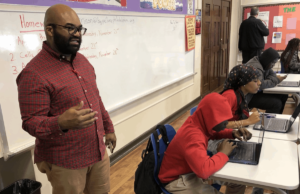Model Schools, Districts, Networks and States for Competency-Based Education

By Mary Ryerse, Janice Walton and Tom Vander Ark
Editor’s Note: This post is an appendix to a recently released report on competency-based education entitled Show What You Know: The Landscape of Competency-Based Education.
The shift to demonstrated competency-based education (CBE) is inevitable and well underway, but it is complex enough that it is likely to be a generation-long process in K-12 education. It is a multidimensional shift—it requires new experiences; new staffing, supports, and structures; new teaching roles and capabilities; new assessments and reports; and new funding models and policies.
The leading advocate for CBE, the International Association for K-12 Online Learning (iNACOL), defines it as advancement based on demonstrated mastery with well-defined competencies that empower students. They stress that students should receive meaningful feedback and timely and differentiated support so that they develop and apply a broad set of skills and dispositions.
We’ve been looking into what schools, districts and networks are doing to achieve effective CBE, and we have assembled an initial list of positive examples. It is is not intended to be a comprehensive list, but rather a sampling of places identified as exemplars by interviewees and/or in other research.
School Districts
- Chugach School District (AK), serving 5 schools
- Dallas Independent School District, serving 230 schools
- East Carver County Schools (MN), serving 18 schools
- Henry County Schools (GA), serving 50 schools
- Kettle Moraine School District (WI), serving 10 schools
- Lindsay Unified School District (CA), serving 9 schools
- Mesa Public Schools (AZ), serving 87 schools
- Mesa Valley School District 51 “D51” (AZ), serving 46 schools
- Montpelier Public Schools (VT), serving 3 schools
- Noble Public Schools (OK), serving 5 schools
- Pinellas County Schools (FL), serving 140 schools
- RSU2 (ME), serving 9 schools
- Sanborn Regional School District (NH), serving 4 schools
- Westminster Public Schools (CO), serving 20 schools
Schools (District-Based)
- Bronx Arena High School (NY), enrolls ~230 students
- Casco Bay High School (ME), enrolls ~365 students
- Cumberland High School (RI), enrolls ~1280 students
- Deer Isle-Stonington High School (ME), enrolls ~110 students
- Del Lago Academy (CA), enrolls ~510 students
- Impact Academy (MN), enrolls ~450 students
- Montpelier High School (VT), enrolls ~275 students
- New Haven Academy (CT), enrolls ~250 students
- Noble High School (ME), enrolls ~1075 students
- Nokomis Regional High School (ME), enrolls ~680 schools
- NYC Alternative Schools (NY), enrolls ~10,000 students
- Purdue Polytechnic High School (IN), XQ school, enrolls ~ 160 students
Charter Schools & Networks
- Aveson Global Leadership Academy (CA), enrolls ~415 students
- Big Picture Learning Schools, network of schools in 25 states
- Blackstone Academy (RI), enrolls ~300 students
- Boston Day & Evening Academy (MA), enrolls ~400 students
- Brooklyn LAB Charter School (NY), XQ school, enrolls ~325 schools
- Crosstown High (TN), XQ school, opens August 2018
- Furr Institute for Innovative Thinking (TX), XQ school, enrolls ~1010 students
- Level Up Academy (MN), enrolls ~150 students
- MC2 Charter School (NH), network of 2 schools
- Powderhouse Studios (MA), XQ school, opens August 2018
- Summit Public Schools (CA/WA), network of 11 schools
- Urban Assembly Maker Academy (NY), enrolls ~100 students
- Washington Leadership Academy (DC), XQ school, enrolls ~110 students
Deeper Learning Networks
- Asia Society International Studies School Network (nationwide), 35 district schools
- ConnectED California, more than 30 school districts in CA, IL, OH, MI, NY, TX, WI
- EL Education Schools (nationwide), network of over 100 schools
- Envision Education (CA), network of 3 schools
- High Tech High (CA), network of 13 schools
- New Visions for Public Schools (NY), network of 75 schools
States Leading the Way
- Florida Department of Education, see: “Key Lessons from the Competency-Based Education Pilot”
- Idaho State Department of Education, see “Key Lessons from the Mastery-Based Education Pilot”
- Maine Department of Education, see Maine’s Proficiency-Based Resources
- Michigan Department of Education, see Michigan’s Competency-Based Education resources
- New Hampshire Department of Education, see New Hampshire post on CompetencyWorks
- North Dakota Department of Public Instruction, see North Dakota’s Competency-Based Education resources
- South Carolina Department of Department of Education, see “South Carolina Framework for Personalized Learning”
- Utah State Board of Education, see “Key Lessons from the Competency-Based Education Grants Program”
This list isn’t comprehensive, and we’re not done with our research yet. We would gladly welcome any suggestions for people doing good work who we may have missed–if you can think of any, please leave a comment in the comments section below!
For more, see:
- Show What You Know: The Landscape of Competency-Based Education
- Competency-Based Education: Definitions and Difference Makers
- How Idaho is Moving Towards Mastery-Based Education
- 15 Dimensions of Personalized Learning
Stay in-the-know with all things EdTech and innovations in learning by signing up to receive the weekly Smart Update.






Joy Nolan
Hi, Getting Smart! Thanks for this list. Please also look at our work: http://www.masterycollaborative.org/ Mastery Collaborative from NYC Department of Education is a growing community for public middle and high schools that are using mastery/competency-based teaching and learning. We support, document, and advocate for culturally responsive mastery practices at 40+ schools across the five boroughs. Our work is showing positive effects, and is convincing us that mastery and culturally responsive education shifts combine to create stronger, more equitable schools. We are a lively and growing community with regular PDs, school visits, online sessions, and community gatherings. Check out our work! Jeremy and Joy, Co-Directors, @masteryNYC
Replies
Erik Day
Hi Joy, thanks for sharing! It sounds like you're doing cool work--the specific focus on cultural responsiveness is an important element that not all programs incorporate. We'll definitely take a deeper look at what you're up to.
Best,
Erik
David Richards
Hello Team Getting Smart! Great list of districts and resources. I would like to draw your attention to Michigan where two districts in particular are making great strides with the implementation of CBE. The first, is Fraser Public Schools (full disclosure: I am the superintendent at Fraser). We have been on the CBE journey since 2012 and have done extensive work around our curriculum and instructional design efforts. We have worked closely with Rose Colby during our implementation and often host visitors from other states and from across Michigan. The second district is Kenowa Hills. This district has worked closely with Virgel Hammonds and Laura Hilger at Knowledgeworks. Both school districts are considered models for the State of Michigan and serve as experts to the State Board of Education. If your travels or interests ever bring you to Michigan, we would welcome the opportunity to walk you through our journey. You can find out more about Fraser Public Schools from our collections of videos that have documented our work: https://www.fraser.k12.mi.us/DistrictVideos
Again - thank you for all of the work you are doing with moving the transformation of our schools forward across our country. Sincerely, Dave Richards
Replies
Erik Day
Thanks for the suggestions, Dave! We'll definitely take a look at both Fraser Public Schools and Kenowa Hills, and will keep them in mind next time we're in Michigan.
Cheers,
Erik
Tom Vander Ark
Bob Sommers added one more to the list: a personalized, community-based, project-based, passion-driven, competency-based education designed to educate the whole student...the Agricultural Education/FFA program, a highly successful program designed in the 1930’s and refined over decades works and consistent with schools noted
Mike Raible
Taylor County Schools in Campbellsville, Kentucky. Only three schools, but an incredible record of no dropouts for ten years and the highest category on the state's common assessments.
Replies
Erik Day
Thanks for the recommendations, Mike! We'll check them out.
Dr. Pamela Swanson, Superintendent
Thank you for the shout out on this meaningful journey! One correction: Please know Westminster Public Schools serves 20 instead of 8 schools. We are a 10,000 student system and all our schools are competency based and serve as the largest systemic full implementation in Colorado.
Replies
Erik Day
Thanks for the correction, Dr. Swanson! We've made the update to the article.
Mike Duncan
Please check out Pike County Public Schools in Georgia: www.pike.k12.ga.us. We have adopted a “Portrait of a Graduate” and identified six competencies-critical thinking, creativity, communication, collaboration, personal responsibility and digital literacy.
Replies
Erik Day
Thanks for the suggestion, Mike! We'll be sure to check out Pike County's work.
Chip Linehan
Lots of great CBE work at Building 21. We run 2 District schools (Allentown and Philadelphia) and have 3 (soon to be 4) affiliate schools who have adopted our model as well. www.building21.org
Replies
Erik Day
Thanks for sharing, Chip. We'll definitely check it out